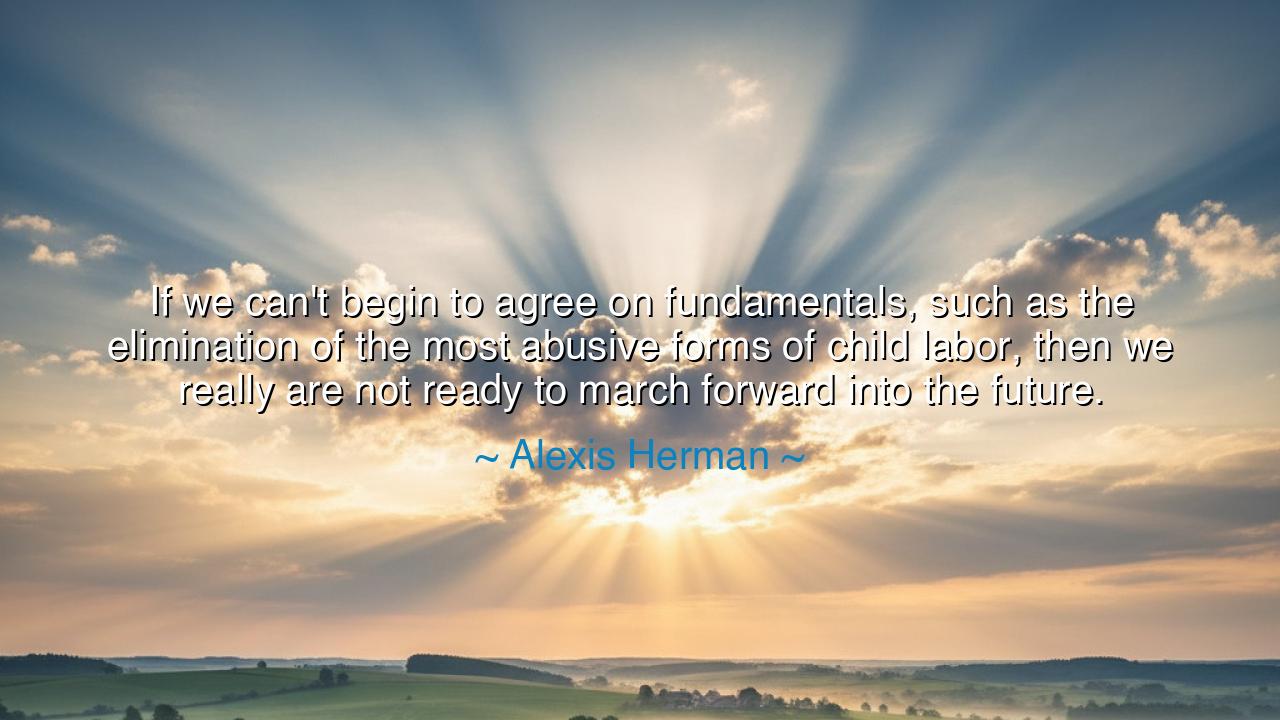
If we can't begin to agree on fundamentals, such as the
If we can't begin to agree on fundamentals, such as the elimination of the most abusive forms of child labor, then we really are not ready to march forward into the future.






“If we can't begin to agree on fundamentals, such as the elimination of the most abusive forms of child labor, then we really are not ready to march forward into the future.”
— Alexis Herman
These words of Alexis Herman, spoken with the gravity of truth and the sorrow of experience, are a call to conscience—a flame held aloft against the darkness of indifference. In them lies a timeless warning: that no civilization can advance into the future while its foundations are cracked by injustice. Before we dream of progress, before we build towers of ambition or monuments of wealth, we must first agree upon the fundamentals of humanity—that no child should toil where joy should dwell, that no innocence should be crushed for profit or convenience. For without this shared moral ground, all our progress is but a march toward ruin.
The elimination of child labor, in its most abusive forms, is not merely a political demand—it is a test of our collective soul. To harm a child is to wound the future itself; to deny them rest, learning, and play is to dim the light of generations yet unborn. When Herman speaks of fundamentals, she names that sacred threshold where civilization either rises to its divine potential or collapses into barbarity disguised as modernity. The child’s laughter, free and unburdened, is the true anthem of progress. If that laughter is stolen, then our victories are hollow, and our dreams are built on ash.
There was once a time—not far behind us—when the factories of the Industrial Revolution roared with the cries of children. Small hands turned great wheels, and young backs bent under burdens meant for grown men. In the mines of England and the mills of America, childhood was consumed in darkness so that lamps might burn in the houses of the wealthy. Reformers like Lewis Hine, camera in hand, ventured into those places of sorrow to bear witness. His photographs—haunting, unflinching—pierced the conscience of a nation. And from that pain came change. Laws were passed, awareness rose, and slowly the chains began to fall. This is what Herman’s words remind us: progress begins when empathy awakens.
But though the past taught us, the lesson is not yet complete. In distant lands and hidden corners, the abusive forms of child labor still persist. Small fingers stitch our clothes, pick our crops, mine our metals. The modern world, glittering and connected, still bears the stain of unseen suffering. Herman’s voice, therefore, is not bound to her time—it is an eternal summons. It demands that we, inheritors of comfort, open our eyes to the invisible and ask ourselves whether we have truly earned the right to call our age enlightened.
To agree on fundamentals is not only a political act but a moral awakening. It means that before we argue over progress, power, or profit, we must agree that human dignity is sacred. It means that the strong must defend the weak, that the voices of leaders must rise for those who cannot speak. For a society that forgets its children forgets itself. The future cannot be built by those who sacrifice the most vulnerable for gain. As Herman warns, until we reconcile this, we are not ready to march forward into the future, for the future demands purity of purpose and unity of heart.
Let this be a teaching for all who hear: true advancement is not measured by speed or wealth, but by the justice with which we treat the powerless. If even one child is enslaved by labor, then all our triumphs are diminished. If even one voice cries in darkness unheard, then the dawn we seek is delayed. The path forward begins not in conquest, but in compassion. The true leader is not the one who climbs highest, but the one who kneels to lift another.
So, my listener, let this wisdom root itself within you: do not march blindly into the future. First, look around you. See the hands that build your world, the lives that sustain your comfort. Stand for what is right before you reach for what is grand. Speak for those who cannot speak, protect those who cannot protect themselves, and in so doing, you will honor the eternal covenant of humanity. For only when the cries of children are replaced by laughter shall we truly be ready to march forward into the light of the future.






AAdministratorAdministrator
Welcome, honored guests. Please leave a comment, we will respond soon